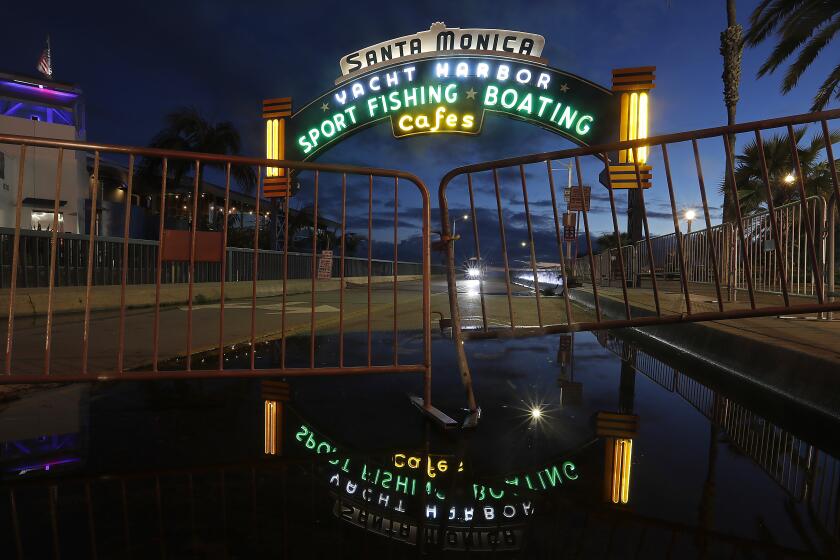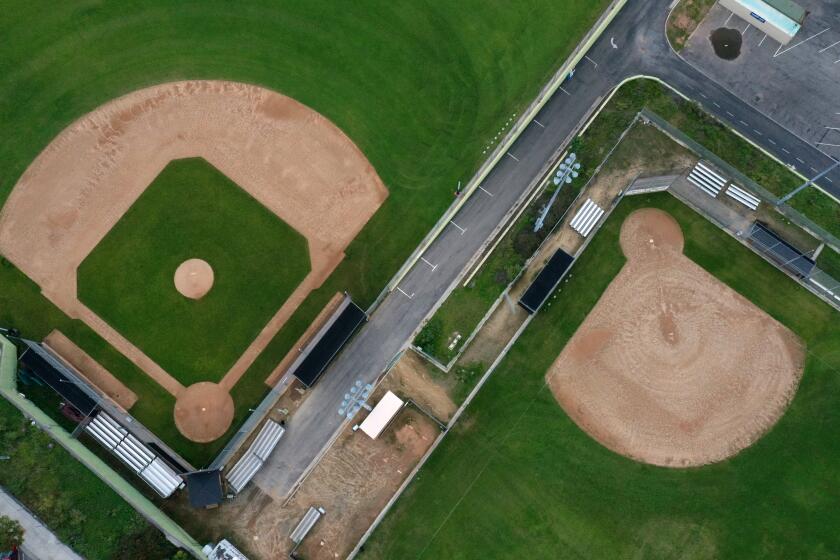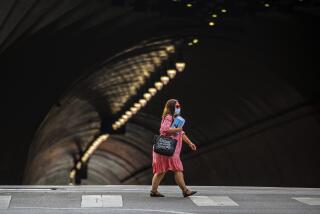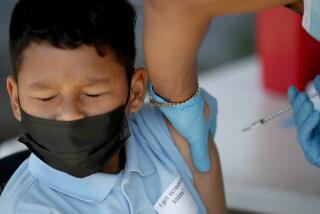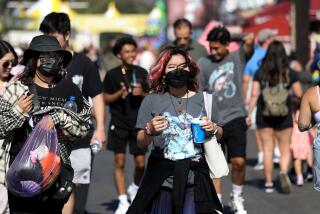Coronavirus hospitalizations climbing sharply in L.A., likely the approaching wave
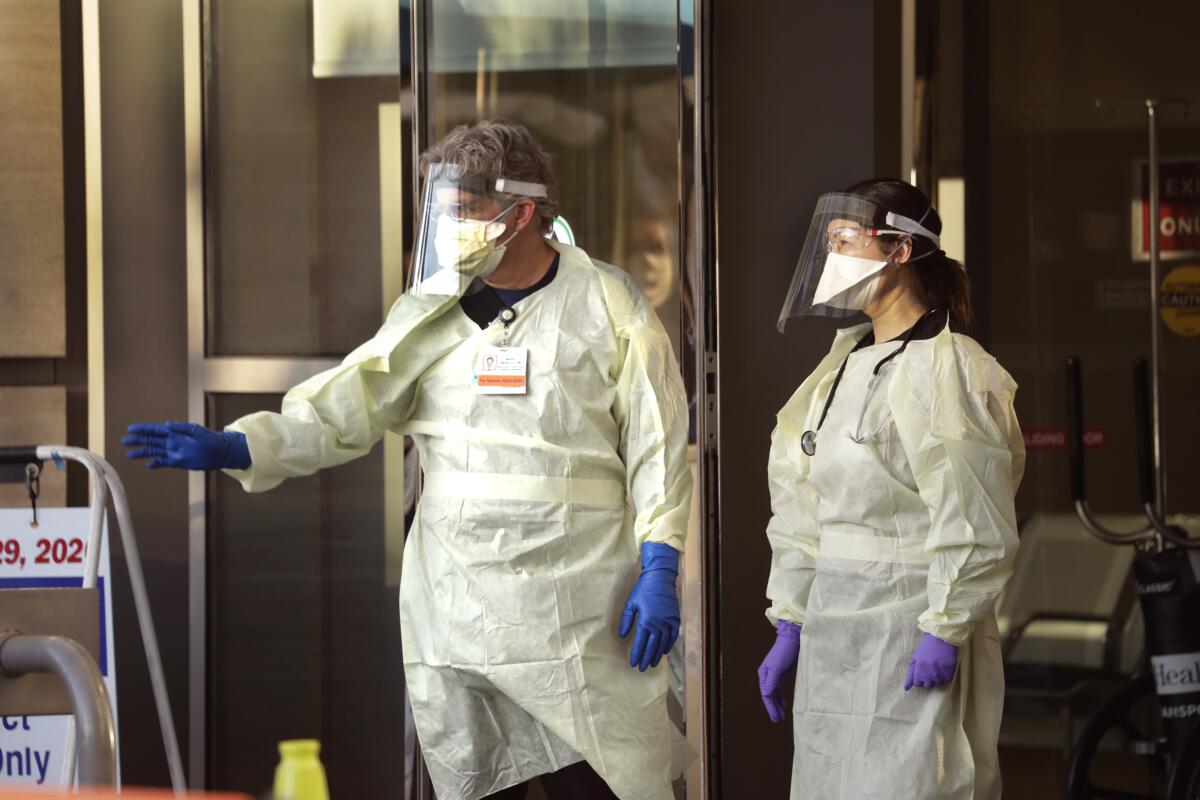
A steep rise in people being hospitalized with COVID-19 in Los Angeles County likely signals the approach of a wave of extremely sick patients that could overwhelm hospitals in the coming weeks, experts say.
As of March 6, five people in the county had been hospitalized at some point with COVID-19. Two weeks later, on Friday, that figure had jumped to 48. By Monday, the total had climbed to 90.
Though the raw numbers remain relatively low, the rate of increase has set many doctors and nurses on edge after watching the disease’s alarming trajectory in China, Italy and now New York City.
Medical providers in L.A. County say they have noticed a steady flow of COVID-19 patients into their ERs in recent days and are rushing to draft policies to handle the tough decisions they anticipate making in the coming weeks as the outbreak surges and they contend with a limited number of beds, equipment and staff.
“We don’t have much time,” said ER physician Dr. Marc Futernick, who works at a downtown L.A. hospital. “These are decisions that we need to make really soon before we are in the throes of the tsunami.”
Eerie photos and stunning aerial shots show what California looks like under Gov. Newsom’s “stay at home” order.
In other places where the disease has been widespread, the number of sick patients has doubled in days, and then doubled again, and again. Judging L.A. County’s outbreak by case numbers alone is unreliable since not everyone who is sick has been tested for the virus and the criteria for who gets tested change regularly, experts say.
Epidemiologists say the number of people hospitalized reveals more about the outbreak’s projected path, since those cases are less likely to be missed.
“One can expect that these numbers of cases of hospitalizations and deaths will continue,” said UCLA epidemiologist Dr. Robert Kim-Farley. “I think we will continue to see this doubling, if you will, every three or four days.”
Officials said Monday that 536 people in L.A. County have tested positive for the virus. In California overall, 1,733 people have been confirmed to have COVID-19, about 4% of the cases nationwide so far, officials said Monday.
Over the last week, many hospitals in L.A. County have reported that a handful of COVID-19 patients have been admitted to their wards. At UCLA, a total of 16 patients had been hospitalized with COVID-19 as of Sunday.
“It hasn’t been overwhelming,” said Futernick, regional medical director for VEP Healthcare, which provides staffing to ERs, ICUs and other medical facilities. “They are definitely coming.”
At most local hospitals, there isn’t much room for new patients. Gov. Gavin Newsom said Monday that 50,000 additional hospital beds would be needed statewide to cope with the outbreak. In L.A. County, 90% percent of ICU beds are already occupied, even with facilities in recent days doubling the number of available beds for patients.
A nurse at St. Francis Medical Center in Lynwood said the hospital has admitted a few COVID-19 patients, but it isn’t full yet.
On Rodeo Drive in Beverly Hills the high-end shops are closed, the normally bustling sidewalks empty because of California coronavirus restrictions.
Yet fear has increased among staff since a patient died of COVID-19 at the hospital over the weekend, said the nurse, who like others interviewed for this article spoke on the condition of anonymity because he didn’t have authorization from his employer.
His family is worried about his safety, he said.
“They’re calling constantly, texting constantly, asking ‘Can’t you just quit?’ and I don’t blame them,” he said. “It’s spooky. I can see it in [my colleagues’] eyes — the fear — in the physicians and nurses and other staff. Every patient that comes in, you don’t know.”
So far, COVID-19 has killed seven people in L.A. County, which has been spared compared with other places. Santa Clara County, which has one-fifth the population L.A. County, has had 13 deaths. The Seattle area has seen 87 people die of the disease. In New York City, 99 people had died as of Monday.
Many in L.A. fear a situation like in New York, now the epicenter of the national outbreak, where hospitals are struggling to find beds and ventilators for patients and masks and gowns for staff to protect themselves from the virus.
In New York City, approximately 1,800 people had been hospitalized for COVID-19 and 12,339 people have been confirmed to have the disease, Mayor Bill De Blasio said Monday.
“We’re seeing milestones in the growth of this disease that are just absolutely staggering, things we could not have imagined just a week or two ago,” De Blasio said at a news conference.
California has implemented some of the strictest social distancing measures in the nation and closed businesses and schools in a desperate attempt to slow the spread of the disease. Newsom on Monday said that crowds at state parks had prompted him to shut down parking lots to deter people from congregating there.
Such measures to reduce the spread of disease will eventually slow the rate of new cases, but not immediately, experts say.
The effects of the shutdowns could take longer than a month to be felt, since people who fell sick before they went into effect could now be passing the virus to their families and other limited contacts, said University of Minnesota epidemiologist Ryan Demmer.
“Things could still rapidly accelerate — not necessarily flatten out — because it’s representing what happened before we went into more stringent social isolation,” he said.
Other epidemiologists offered more optimistic outlooks.
“After about two weeks, we will start to really see the impact of our physical distancing measures,” said Kim-Farley of UCLA, noting that the longest it can take for someone to develop symptoms of the virus is about 14 days.
Shutdowns appeared to have worked in China, though it is unclear what will happen as people continue to go back to work, he said. In Italy, which has also resorted to widespread lockdowns, a slowdown of case numbers has yet to be seen, probably because the measures were implemented too late.
“It was way widespread in the community before the physical distancing measures were put into place,” he said. “I would be expecting that within another week or two ... the number of deaths will slow down ... I think it was just getting behind the curve on that.”
California’s landscape of everyday life is changing under the state’s stay-home order. These drone photos prove it.
Awaiting such a surge in L.A. County has providers feeling what they describe as unparalleled anxiety. A doctor at a major L.A. hospital said she is terrified by the lack of planning, communication with staff and availability of medical gear. She said providers exposed to the virus at her hospital can’t get tested.
“We’re kind of just flying by the seat of our pants,” she said. “This is the worst thing I think any of us have encountered.”
An ER doctor at a different L.A. hospital compared her anxiety now to fears of a mass shooting.
“You always think about if someone comes in with a gun and where would you go and where would you hide,” she said. “But this is actually giving me some chest pressure that I haven’t felt before — that heaviness just weighing on you.”
Times staff writer Taryn Luna, in Sacramento, contributed to this report.
More to Read
Sign up for Essential California
The most important California stories and recommendations in your inbox every morning.
You may occasionally receive promotional content from the Los Angeles Times.
